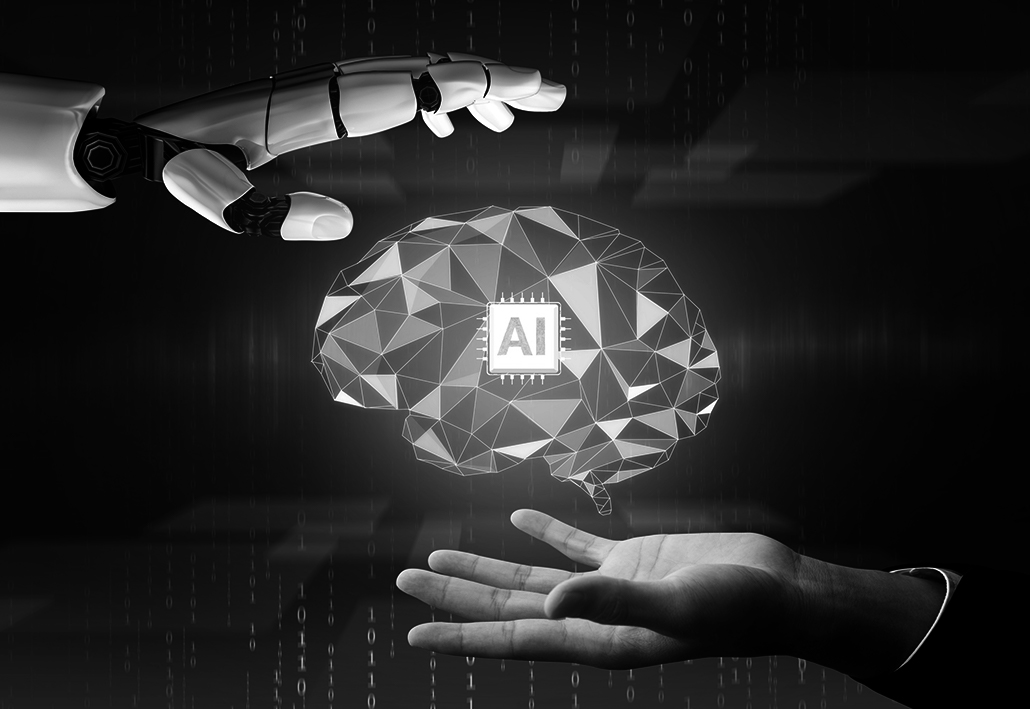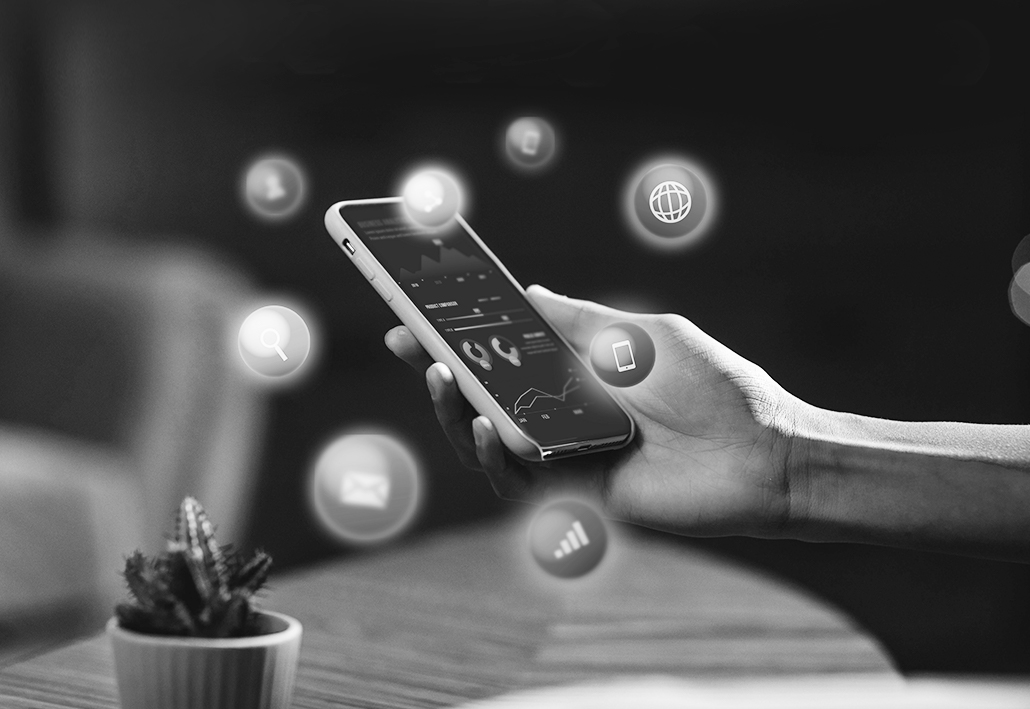How to Use Artificial Intelligence (AI) in
Digital Marketing?

As the digital world keeps evolving, artificial intelligence (AI) is rapidly becoming a cornerstone of modern marketing. From automated customer service to personalised content, AI offers countless opportunities to optimise marketing strategies. So, how exactly can AI in digital marketing be used to supercharge your efforts? Let’s dive deep into the transformative potential of AI in the marketing world.
What is AI Marketing?
AI marketing is the use of artificial intelligence technology to automate and enhance marketing processes. It leverages data, machine learning, and algorithms to make real-time decisions, optimise campaigns, and predict customer behaviour. Essentially, it’s about using advanced tech to work smarter, not harder.
For marketers, AI can mean anything from automating mundane tasks like data analysis to predicting which product a customer might want to buy next. This level of personalisation and automation can drastically improve customer experience while increasing efficiency. The use of AI in digital marketing is growing fast, and it’s revolutionising how we connect with audiences.
How Do Digital Marketers Use AI?
AI isn’t just for tech companies. It’s transforming how marketers operate across industries. Here’s how using AI in digital marketing can help you today:
Personalisation at Scale
AI analyses massive datasets to help brands understand individual customer preferences and behaviours. It then tailors content, recommendations, and even ads to each person, delivering highly personalised experiences that drive engagement and sales. Platforms like Amazon use AI to offer personalised product recommendations, while Spotify uses it to craft playlists based on listening habits.
Chatbots and Customer Service Automation
AI-driven chatbots are revolutionising customer service. These bots can handle basic queries, resolve issues, and guide customers through their purchasing journey 24/7. For example, H&M uses an AI chatbot called "Ada" to help customers find outfits, check stock, and answer questions.
Predictive Analytics
AI tools for digital marketing, like predictive analytics, are one of the most powerful ways AI is changing the game. By analysing past data and consumer behaviour, AI can forecast future trends and outcomes. This allows marketers to anticipate customer needs, optimise product launches, and adjust marketing campaigns in real time.
Content Creation and Optimisation
Content creation is at the heart of digital marketing, and AI is stepping in to make the process faster, more efficient, and incredibly personalised. Digital marketing AI tools can generate written content for blogs, social media posts, and even advertisements, reducing the time spent on content production.
AI for Blog Posts & Articles
Tools like Jarvis (Jasper) and Copy.ai can generate
long-form articles, product descriptions, and SEO-optimised blog posts based on a few keywords or topic inputs.
This not only saves time but also ensures
that the content is aligned with current trends and
search engine optimisation (SEO) best practices.
AI for Social Media Content
AI platforms such as Hootsuite and Lately use machine learning to
optimise content for social media.
These tools analyse engagement patterns and suggest the best times to post, what type of content resonates
best with your audience, and even generate post captions that drive more interaction.
AI for Video Content
Video content is huge, and AI tools for digital marketing like Pictory and Lumen5 allow marketers to turn blog posts into engaging videos in a fraction of the time. These tools can analyse a blog post, extract key points, and create a video script, automatically generating visuals and music to match.
Email Campaign Optimisation
AI enhances email marketing by determining the best time to send emails, personalising subject lines, and segmenting audiences. Tools like Mailchimp and Brevo use AI to analyse engagement rates, helping marketers fine-tune their email campaigns for maximum impact.
Best AI Tools for Digital Marketing (Paid + Free)
AI is not one-size-fits-all. Depending on what you're trying to accomplish, content, SEO, email, ads, or analytics, there’s an AI tool (or five) that can help. Here’s a categorised breakdown so you can build your perfect AI marketing stack:
SEO & Keyword Research Tools
Moz Pro (Freemium)
Moz offers a suite of tools, including keyword research, site audits, and backlink tracking. Its Keyword Explorer gives suggestions with search volume, difficulty, and organic CTR super handy for content planning. MozBar (free Chrome extension) is also fantastic for quick SEO analysis.
Ubersuggest (Freemium)
Created by Neil Patel, Ubersuggest is beginner-friendly and offers keyword data, traffic estimations, and backlink profiles. Great for solopreneurs and small businesses testing the SEO waters.
Surfer SEO (Paid)
This tool analyses top-ranking pages for any keyword and gives a data-backed recipe to rank higher. It integrates with Google Docs and Jasper for seamless content optimisation.
Semrush (Paid)
An enterprise-grade SEO platform with powerful competitor analysis, keyword tracking, and content gap tools. Its AI-backed writing assistant is gold for long-form content optimisation.
Content Creation & Copywriting Tools
Jasper AI (formerly Jarvis) (Paid)
Jasper can write blog posts, emails, captions, product descriptions, and even sales pages using your brand tone. It’s like having a personal copywriter on caffeine.
Copy.ai (Freemium)
A great alternative to Jasper, especially for short-form content. It's ideal for social media posts, headlines, and ad copy with plenty of free usage.
Analytics & Insights
Google Analytics 4 (GA4) (Free)
GA4’s AI-powered insights help marketers track user journeys and predict outcomes like churn probability and purchase likelihood. It’s essential for performance marketing.
Email Marketing & Automation
Mailchimp (Freemium)
Their AI predicts the best send time, segments your audience based on behaviour, and can even write email content for you now. Perfect for small businesses.
Advertising & Performance Marketing
Adzooma (Freemium)
Connects with Google, Facebook, and Microsoft Ads. Adzooma’s AI suggests optimisation changes to improve ad performance even in the free plan.
Chatbots & Customer Engagement
Tidio (Freemium)
Combines live chat with AI-powered chatbots. Automates FAQs, lead generation, and support without needing to code. Perfect for Shopify and WordPress users.
Advantages of AI in Digital Marketing
Enhanced Efficiency & Automation
AI takes over repetitive and time-consuming tasks like data entry, A/B testing, report generation, and even customer segmentation. This means marketers can spend more time being creative and strategic, the things machines can’t do (yet).
Hyper-Personalisation at Scale
AI analyses massive amounts of customer data in real-time to create personalised experiences not just on websites, but across emails, ads, and social media. It remembers what your audience clicked last time, how long they stayed on a page, and what they abandoned in their cart and uses that data to serve up the perfect offer or message.
Data-Driven Decision Making
AI tools help you make smarter decisions by identifying trends, spotting patterns, and forecasting outcomes. For instance, AI in marketing examples, such as targeted campaigns, can help predict what will resonate with customers.
Cons of AI in Digital Marketing
High Initial Costs: Implementing AI-powered systems can require a significant upfront investment, not just in tools, but in training and integration. For small businesses, the cost of premium tools like Salesforce Einstein or Adobe Sensei can be prohibitive.
Requires High-Quality Data: AI only works as well as the data it’s given. If your CRM is a mess, or your customer data is incomplete or biased, your AI outputs, like recommendations and predictions, will be flawed.
Loss of Human Touch: AI can mimic personalisation, but it can’t feel empathy. Over-reliance on AI can make your brand feel cold, robotic, or out of touch, especially on channels like social media where tone and timing matter.
Risk of Over-Automation: If you automate everything, you risk sounding generic and losing brand authenticity. AI-generated emails might get opened, but will they spark loyalty?
Examples of AI in Digital Marketing
Netflix’s Personalised Recommendations
Netflix uses AI to recommend movies and shows based on your viewing habits. The more you watch, the better it understands your preferences, offering you recommendations that seem almost telepathic.
Coca-Cola’s AI-Driven Campaigns
Coca-Cola uses AI to create personalised marketing content that resonates with local markets. Using insights from AI-powered data, the company tailors messages and advertisements to match regional preferences.
Sephora’s Virtual Artist
Sephora uses an AI-powered app called “Virtual Artist” that allows customers to try on makeup virtually, enhancing customer satisfaction and driving online sales.
Conclusion
Artificial Intelligence is transforming digital marketing in ways we could have only imagined a few years ago. By automating mundane tasks, delivering highly personalised content, optimising content creation processes, and providing data-driven insights, AI is enabling marketers to make smarter decisions, reach the right audience at the right time, and boost overall performance.
The future of AI in marketing is undeniably intertwined with the digital marketing landscape—embracing this technology is no longer optional but essential for staying ahead in today’s competitive environment.
So, whether you’re looking to enhance your customer experience, streamline your workflows, or create high-quality content in record time, AI tools for digital marketing are key to unlocking next-level marketing success.
following blog articles.
